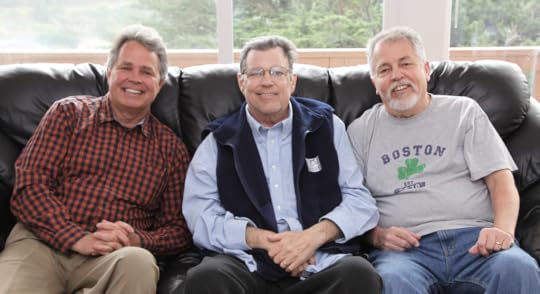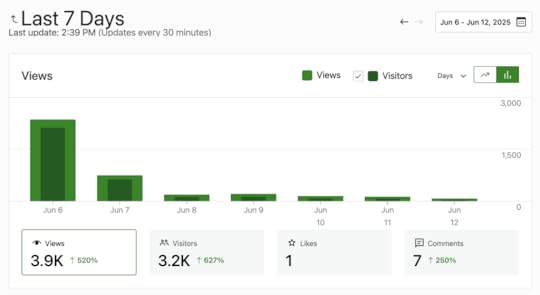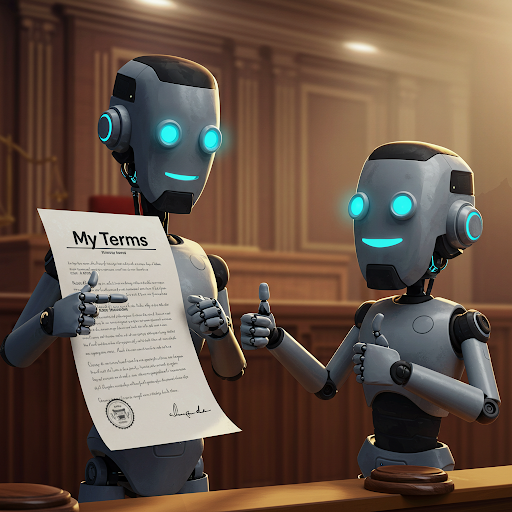Doc Searls's Blog, page 9
June 18, 2025
Wednesday, 18 June 2025
A summer lamentation. Yesterday was the 69th birthday of Sparky, the puppy I got for my 8th birthday in 1956. He died at age one, and is buried under the parking lot at the Boulevard Square strip mall that paves the paradise of scrub oak and pitch pines that was our summer playground at the edge of New Jersey's Pine Barrens in what is now the 13th-largest municipality in the state. Sparky was hit by a car while hunting for love. Beside Sparky lies Kim, another "intact" male dog who died a year before we got Sparky, and a parakeet named Poco. Kim was also killed by a car. Poco fell behind a spare door that partly covered the studs of an open wall in our summer home, and was found years later when we needed the door. We buried him in an empty cereal box.
June 17, 2025
Tuesday, 17 June, 2025
It's not the heat (though we have that too). Humidity is 85% here right now. Everything is sticky. Summer in the Midwest. Also the East. And the South. Only more of it. And worse. Interesting: warmer oceans are a cause. The WaPo explains. (Sorry, paywall.)
June 16, 2025
Did tracking-based advertising just get blown up in Europe?
 A frame from Apple’s “Flock” ad, in which a person uses Safari to blow up a swarm of flying surveillance cameras. It predates this ruling.
A frame from Apple’s “Flock” ad, in which a person uses Safari to blow up a swarm of flying surveillance cameras. It predates this ruling.As I read it (in an English translation here), an appeals court in Brussels ruled consent notifications on websites illegal (or close enough) in the EU. Your interpretation may vary. Here are some sources I’ve gathered to help with that:
Jamie Smith: Targeting ads using Real Time Bidding is now illegal, and how will we know which AI is which?Belgian Data Protection Authority (which won the appeal): The Market Court rules in the IAB Europe caseDigiday: WTF just happened to the IAB Europe’s TCF — and what does it mean for targeted ads in the EU?Global Law Today: In a landmark decision, the Belgian Court of Appeal has upheld the Belgian Data Protection Authority’s (DPA) ruling that the Transparency & Consent Framework (TCF), developed by IAB Europe, violates the General Data Protection Regulation (GDPR).Sirdata: TCF: The Belgian Market Court annuls the APD’s decision against IAB Europe…PPCland: Belgian court limits IAB Europe’s role in TCF frameworkPrivacy Matters—DLA Piper’s Global Privacy and Data Protection Resource: EU: Brussels Court of Appeal rules on IAB Europe and the TC String – Implications for GDPR ComplianceDigital Information World: Digital Ads Face Overhaul After Belgian Ruling Invalidates Transparency and Consent FrameworkDigital Policy Alert: Belgium: Market Court issued ruling classifying the Transparency and Consent String as personal data under Interactive Advertising Bureau’s Transparency and Consent FrameworkAdblock: Understanding the Belgian Market Court Ruling on IAB Europe’s TCFIAB Europe (which lost the appeal): Belgian Market Court Confirms Limited Role of IAB Europe In The TCFMy dream for what happens next is that we reverse the whole consent process, based on IEEE P7012, aka MyTerms:
That’s your agent on the left. On the right might be any of the world’s sites and services. What you both agree to is a contract that you proffer as the first party, choosing one published at Customer Commons or the equivalent, on the Creative Commons model.
I now believe more than ever that MyTerms is the most important standard in development today.
Let’s prove it.
Monday, 16 June 2025
Did tracking-based advertising just get blown up in Europe? As I read it (in an English translation here), an appeals court in Brussels ruled consent notifications on websites illegal. Your interpretation may vary. Here are some I've gathered to help with that:
Jamie Smith: Targeting ads using Real Time Bidding is now illegal, and how will we know which AI is which?
Belgian Data Protection Authority (which won the appeal): The Market Court rules in the IAB Europe case
Global Law Today: In a landmark decision, the Belgian Court of Appeal has upheld the Belgian Data Protection Authority’s (DPA) ruling that the Transparency & Consent Framework (TCF), developed by IAB Europe, violates the General Data Protection Regulation (GDPR).
Sirdata: TCF: The Belgian Market Court annuls the APD’s decision against IAB Europe…
PPCland: Belgian court limits IAB Europe's role in TCF framework
Privacy Matters—DLA Piper's Global Privacy and Data Protection Resource: EU: Brussels Court of Appeal rules on IAB Europe and the TC String – Implications for GDPR Compliance
Digital Information World: Digital Ads Face Overhaul After Belgian Ruling Invalidates Transparency and Consent Framework
Digital Policy Alert: Belgium: Market Court issued ruling classifying the Transparency and Consent String as personal data under Interactive Advertising Bureau's Transparency and Consent Framework
Adblock: Understanding the Belgian Market Court Ruling on IAB Europe’s TCF
IAB Europe (which lost the appeal): Belgian Market Court Confirms Limited Role of IAB Europe In The TCF
Sunday, 15 June 2025

Show me where “your privacy choices” are kept, and how compliance can be audited, and I might believe corporate promises. On our Apple TV 4k box, an app for a subscription service (e.g. Netflix, Prime, CNN, Fox News, MSNBC, Haystack, whatever) usually opens with a message that gives one the choice to “Ask app not to track,” or to allow it. When I opened the Fox News app on Saturday, however, it said this:

So I deleted the app. I’ll miss seeing Fox News’ coverage of events, and comparing it with what other cable news services are saying. But I tend to avoid all of them because they’re almost entirely about showcasing show anchors and guest talking heads. Meanshile, CNN has been making it easy for me to avoid seeing their heads by reducing their service to this:

I got rid of that app too.
Only MSNBC seems to be working. While I might presume that they’re obeying my past request not to track me, there is no way to tell. Additionally, since I only ask apps not to track me, there is no reason for me to have faith in any of these services’ intentions regarding personal privacy.
What I wrote here and here four years ago still applies. Asking isn’t telling. And there remains no way to know for sure that my privacy requests or settings are respected. The situation is no different with Apple’s latest ad—a 1:30 film titled Flock that’s currently on YouTube (and in shorter forms in TV ads, such as in the current NBA finals). In it, a woman blows up flying surveillance cameras that want to follow her everywhere just by opening Safari. Here’s a screengrab:

Even if Safari is fully respectful of personal privacy, countless other apps are not. The same goes for apps on streaming devices such as the Apple TV 4K. And for your TV. (Here is Consumer Reports on that.)
June 14, 2025
Saturday, 14 June 2025
 David Hodskins, Ray Simone and Doc Searls on Ray’s couch, their last time together, a few days before Ray died.
David Hodskins, Ray Simone and Doc Searls on Ray’s couch, their last time together, a few days before Ray died.And that guidance led to what I’m doing here. Late in the last millennium, I was the creative director and main copy writer for Hodskins Simone & Searls, a hot young advertising agency in North Carolina. I also still wrote often for a local Magazine called The Sun, which has since grown to become one of the world’s best. Since all of its archives are digitized and available to subscribers (which I still am) online, I can cringe my way through my oeuvre there. That’s what I was doing a few minutes ago while looking for for something more recent than this, from the August 1980 issue:
I make my living in advertising.
Mostly I write advertising copy. Which means I write a lot of short, choppy sentences. Like this.
That’s basic copywriting style, by the way. Like peanut brittle, ad copy works best when broken into fragments.
One-line paragraphs are nice too.
At one time, advertising was a much more wordy business. And a lot less sophisticated.
Take the George Washington Hill school of advertising.
Hill was a Durham native, the head of the American Tobacco Company. One day he was dissatisfied with a bunch of advertising ideas that were submitted to him. So he hocked up a wad of phlegm and spat an oyster, right on the shiny corporate conference table.
“See that?” he said. “You may not like it, but you won’t forget it. That’s how I want my advertising to work.”
So to George Washington Hill, and others like him, we owe our nation’s hatred of advertising you just wish you could forget.
Advertising matured as an art in the early Sixties, when those wonderful Volkswagen ads came along. Like the product, the ads were simple and straightforward. They made an impression without leaving bruises.
This was the “creative” school of advertising. After its style became fashionable, some healthy fundamentalist caution developed, best expressed by the new slogan of Benton & Bowles, the Brooks Brothers of advertising agencies: “It’s not creative unless it sells.”
This may sound like a harsh way to judge an art, but I’d rather motivate a customer than please a critic. Just how do you motivate a customer?
The first impulse in advertising, as in all human life, is to argue. But think: how often, even when you make a perfect case, do you win an argument? To argue is to take sides, and it is human nature not to yield a side once taken. If you want a customer to side with your product, don’t start an argument. Some people think advertising motivates by brainwashing. But advertising is not in the business of changing people’s minds. It is in the business of opening people’s minds. That’s what makes advertising an art.
An art, I submit, speaks to the heart as well as the head. A mind that says “ouch” to bombast and “no”to argument will say “aha” to art.
“Aha” is the response advertising looks for. Basically, products sell themselves. Advertising just opens people’s hearts to a product.
The heart is the key. While reason and logic have seats on the mental board of directors, it is feelings that usually cast the deciding votes.
In fact, a lot of what we call thinking is just the noise our minds make while adjusting thoughts to suit feelings.
This doesn’t mean that good advertising makes a purely emotional case, but that advertising appreciates the way the mind operates.
It can be very hard to exercise that appreciation, however, when you’ve got payroll and salesmen and product development to worry about.
That’s why ad agencies exist, so the clients can work on other things, like making the products worth buying.
The interpersonal chemistry, both creative and procedural, inside an ad agency, is fascinating. Good ideas are amplified by other good ideas, refined by other viewpoints, and focused by collective purpose.
The result is usually better advertising, and therefore better results, than a company can get on its own.
It’s this “team art” that I like best about being part of an ad agency. It’s like playing one of your better team sports, or playing in a good jazz band.
David Searls
Durham, N.C.
I’m sharing this for several reasons. One is that it’s not a bad piece of writing. Another is that it has a nugget or two that pertain to life in general rather than just the advertising biz. Another is that it provides some source material for heirs or biographers, should any ever be interested. It’s also a bit emotional for me, because David Hodskins and Ray Simone were more than just business partners. They were great friends who guided my life in many ways in addition to the professional ones. They also both died way too young.
From the Department of Redundancy Department. I’ve lately been writing daily posts on this blog in the way I wrote them in my original blog. There would be a banner title for each day (created automatically), and under each of those, I would have headlines over each of the day’s posts, which varied in length from one line to many paragraphs, though most were short. The headlines were punchlines, putting the close or conclusion of the post above it. This was a trick I learned from Esquire‘s Dubious Achievement Awards, which were brilliant but are now unfindable for non-subscibers. (And maybe for subscribers too. Without subscribing, I can’t tell.) Anyway, since I don’t want my archives to have piles of posts each titled by a day of the week, I am using the whole day and date, which the blog theme already posts. Hence the headline for this one.
June 13, 2025
Friday
Kwaaiday the 13th. If you're curious about personal AI (and you should be, especially of the open source kind), you might like to sit in on a meeting of folks volunteering toward making it happen, Kwaai has its weekly meeting going on right now at the Zoom link atop its home page. See some of ya'll there. (I just noticed this didn't get posted. Still, check Kwaai out.)
Paper shavings. I just learned by Ed Cone that Greensboro, where I lived (and went to college) from '65 to '69, is maybe, sort of, turning into an aerospace place. (He points here.) More importantly, he offhandedly refers to the "rah rah local media," which presumably includes the News & Record, which was the News (morning) and Record (evening) when I was in town. That last link reveals that the remains of that once-great paper (and, before that, papers) is down to just five reporters. (The remains of our paper here in Bloomington, Indiana, a quarter the size of Greensboro, had seven, last I looked.) More about the change here.
June 12, 2025
Thursday
 This blog’s stats for the last week. Down, but never out.
This blog’s stats for the last week. Down, but never out.And having any readers is better than having none. So far (2:30 pm), this blog post has had three visitors. (Update at 11pm: eleven visitors.) And I’m not even sure those visitors have read any of this. Meanwhile, Online Sports Betting is For Losers is now up to 3,252 visits, second all-time behind Death is a Feature (6,643 visits).
But those are exceptions. Typically, a post here gets between a handful and a few dozen visits. But ya never know what might catch fire. Over at the ProjectVRM blog, A simple plan to de-enshittify CVS, which I posted in February, clocked several hundred visits a couple days ago, thanks to leverage from this post in Ted Gioia’s newsletter. So I keep it up.
And, while you’re at it, count the stars. If you ever cared at all about Brian Wilson and his music, try to keep your eyes dry when you watch this BBC Music celebration of “God only knows.”
Bonus link: Ted Gioia’s Brian Wilson is My Brick. The one in question is from a demolished building at Hawthorne High, of which both Brian and Ted are alumni. There’s much more. Read the whole thing.
Good AI-free content. I’m closing a bunch of tabs I opened during an exploration of Lee Miller‘s work as a photographer, especially while she witnessed the liberation of concentration camps and the fall of the Third Reich. She would have been 118 years old this year, but this essay in The New Yorker, published when she would have been 100 (she died 30 years earlier), is especially worth reading if you can get behind the paywall.
If personal AIs are ever to become agents for us, they should amplify rather than fake up our agency in the world. Is there anything more human than intent? I wasn’t addressing that question when I wrote The Intention Economy (now only $13.93 in hardcover). But I was thinking about paths toward fulfilling the promise of the subtitle: When Customers Take Charge. Now AI is with us, and it looks like personal AI is one of those paths (and maybe the main one). Now I find myself reading Barry Petchesky‘s Whatever AI Looks Like, It’s Not, in which I am knocked over by this line from Ted Chiang’s Why AI Isn’t Going to Make Art, in The New Yorker: “it reduces the amount of intention in the world.” The suggestion by both Barry and Ted is that by hoovering up as much as possible of all the world’s published human expression, and making it easy to re-express fuck-all—from essays to correspondence to scholarship to works of art—the intent we might have to make those things is reduced. Rather than write, or teach, or learn, or draw, we prompt an AI to do it for us. The metaphor that comes to my mind is one from broadcasting. Rather than pushing a signal out to the world through an antenna, the energy is “shunted to ground.” Or just turned down to a level where another process—the AI one—does the work. In case you didn’t click on the link the first time, try fingering personal AI again. That image was created by an AI, but all the words are mine. We did it together, because the AI can draw better than me, but I can write better than it. And it can’t write because it has no idea what I mean. Or even an idea at all. Sometimes it can fake it, and that’s plenty enough—and more all the time.
One of them is tweetlike posts on a blog. Jeremy Felt has a notes-oriented blog where he just pointed here with this: “… I think I can point to Doc Searls as the one who pushed me the last bit. His recent streak of daily notes with short, interesting, bits and bobs is a great format! I also saw Chuck mention format staleness and that probably helped with some ‘hey, it’s a good time for change’ thinking.” Which makes me think stinkiest stale format is the branded silo: a category that contains all the branded social media: Facebook, Linkedin, Xitter, Threads, Bluesky, and even Mastodon (which, even though it’s a federated alternative, is still a branded kind of social medium, emulating a silo without quite being one). What’s not stale is the blog. Jeremy has one. Chuck has one. I have one here. That I’m writing this with Wordland on a site produced in WordPress does not make either a silo or a platform. They are just tools for individuals to write their own stuff their own ways.
June 11, 2025
Wednesday
If advertising corrupts and digital advertising corrupts absolutely, we may be seeing a bad sign. When my wife bought her new iPhone 16, the salesperson showed off Apple Intelligence by demonstrating how it would help her shop by pointing the camera at something… or whatever, I don’t remember. What I do remember was that the salesperson, and presumably Apple, had the idea that most of what we do is shop. So now I’m reading The Top New Features in Apple’s iOS 26 and iPadOS 26 in Wired, and see, about half way down, “There’s even a feature very similar to Google Lens or Google’s Circle to Search, where you can take a screenshot and then highlight a specific thing on the page you want to search via Google, or through another app that’s installed on your phone that supports the feature, like Etsy. So you can highlight a vase, for example, and then find similar results via Google or similar shoppable vases on Etsy.” And the video image on screen is of a shopping “experience.” Will Apple get a kickback if you buy that vase? If so, it has started down a slippery slope.
More loving. While digging around through posts on Sly and Brian (see below), I found myself reminded that Kevin Love‘s dad was Stan Love, who was the brother of Mike Love, the Beach Boys front man. Here’s Mike’s memorial Instagram. And whoa… (after further digging), get this: Stan and Mike’s sister is Maureen Love, harpist with Pink Martini, a band my wife and I also (no pun intended, but it fits) love.
On losing the best. Lindsey Adler on Brian Wilson. Ted Gioia on Sly Stone. Bonus link for those with an LATimes subscription: a 1965 piece about the Beach Boys.
Can one drop off adults? I had no idea there was such a thing as a box where you can drop off unwanted babies.
We’ll fix it. An Ugly New Marketing Strategy Is Driving Me Nuts (and You Too) is Ted Gioia‘s newsletter today, and it references A Simple Plan to De-enshittify CVS at some length, also kindly sending some of Ted’s 242,000+ subscribers to ProjectVRM, which has been fighting what Ted rightly calls the annoyance economy since 2006. It’s a good sign.
Perspective. At the end of its day, this blog post had 13 visits. Online Sports Betting is for Losers has had 3,169.
June 9, 2025
Tuesday
Dig it. Nitin Badjatia, who has been with both ProjectVRM and Customer Commons from their beginnings, has a wise new newsletter.
Doc Searls's Blog
- Doc Searls's profile
- 11 followers





